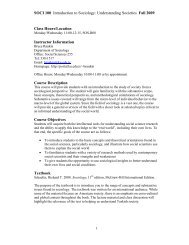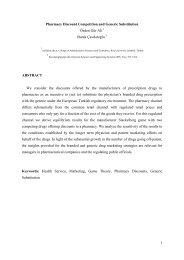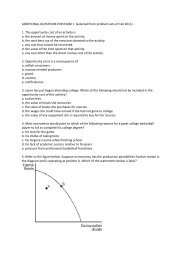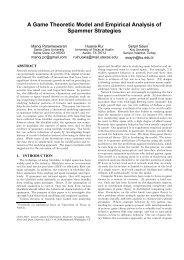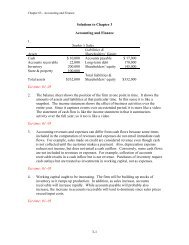Chapter 1 Introducing Social Psychology
Chapter 1 Introducing Social Psychology
Chapter 1 Introducing Social Psychology
Create successful ePaper yourself
Turn your PDF publications into a flip-book with our unique Google optimized e-Paper software.
09.02.2012[<strong>Social</strong>] ψ has a long past, but only a shorthistory• Essentially a 20 th century field• ‘<strong>Social</strong> psychology’ as a term came into common usage aroundthe turn of the 20th century.• 90% of social psychologists who had ever lived were still alive in1979 (Cartright in Brehm, et al, 2005)• In contrast: Personality ψ - Freud, Jung, Adler, Rogers are alllong dead.• <strong>Social</strong> psychology is interested in old issues• Do individuals perceive reality accurately?• Are people capable of free will, or is behavior is determined?• Are the basic instincts of humans good or evil?Birth and Infancy: 1880s – 1920s• 1875 - W. Wundt (Germany) & W. James (in the US) establishthe first psychology experiments• 1880s-1900s – European scholars were influential• 1898 - First social ψ Experiment by N. Triplett• How social factors effected bicycle riding? (<strong>Social</strong> Facilitation)• 1908- First textbooks contained the phrase “social psychology”in their titles by McDougall & Ross• 1924 – most influential textbook by Floyd Allport• Accepted as the “rise of experimentation in social ψ”1930s - social ψ began to grow as a solid field• Kurt Lewin “Father of <strong>Social</strong> Psy” (1890-1947)• B(ehavior) = P(erson)+ S (ituation)• Muzafer Sherif• Norm formation studies• WW2 and Post war era• Sparked much research (e.g. authoritarian personality,conformity, obedience, persuasion, group dynamics)• Practical applications (e.g. communication, propaganda)• Brain drain from Germany (mainly to the U.S)6






